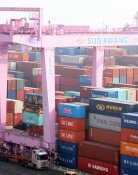Prolonged impeachment crisis and its impact on the financial market
Prolonged impeachment crisis and its impact on the financial market
Posted December. 11, 2024 07:40,
Updated December. 11, 2024 07:40
The financial market, which had managed to withstand various shocks, now faces a severe test due to the ongoing political crisis. Despite President Yoon Suk Yeol’s abrupt declaration of martial law on the night of last Tuesday, the financial market showed resilience from Wednesday through Friday. Although the situation was turbulent, it did not escalate to a full-blown shock. The government’s swift response, including a 50 trillion won liquidity injection, helped stabilize the situation, drawing positive recognition from international sources. For instance, Bloomberg columnist Daniel Moss commented on Wednesday (local time) in his column titled “Capitalism is the Unsung Hero of Korean Democracy,” stating, “The authorities backstopped the system without much fuss.”
However, the prolonged impeachment crisis, triggered by the National Assembly's failure to vote on the impeachment bill, threatens the market's stability. Uncertainty, a major deterrent for the financial market, has risen significantly. Experts speculated that despite its political implications, impeachment might ultimately provide clarity by eliminating ambiguity in the financial market. Impeachment was seen as a path that had already been "tried and tested," with the belief that its resolution would eliminate uncertainty by providing a clear direction. However, the failure of impeachment has only deepened the uncertainty, raising questions about the future of the president’s authority and who will hold the "key" to governing the country. Moreover, there is no guarantee as to how long this political instability will persist.
The financial market is now facing the worst-case scenario. Some attempted to find solace by referencing past political crises, arguing that the repercussions would eventually subside. They pointed to the impeachments of former Presidents Roh Moo-hyun in 2004 and Park Geun-hye from December 2016 to March 2017, claiming that these events did not significantly impact the financial market or growth rate. However, in 2004, Korea's economy grew by 5%, and the semiconductor industry boomed, factors that helped buffer the market during that time.
Given the economic repercussions of political uncertainty, it would be ideal if both the ruling and opposition parties could come together to outline a clear timeline and roadmap for the future, but such cooperation seems unlikely. Ultimately, the hope is that economic and financial authorities will act more decisively and flexibly in response to the potential for a prolonged crisis. We have the experience to navigate through difficult times—during the global financial crisis and the COVID-19 pandemic, for example, the financial market faltered but did not collapse. In the absence of strong political leadership, the country must maintain strong economic leadership. Only with this will it be possible to weather the current uncertainty and eventually rebound.







